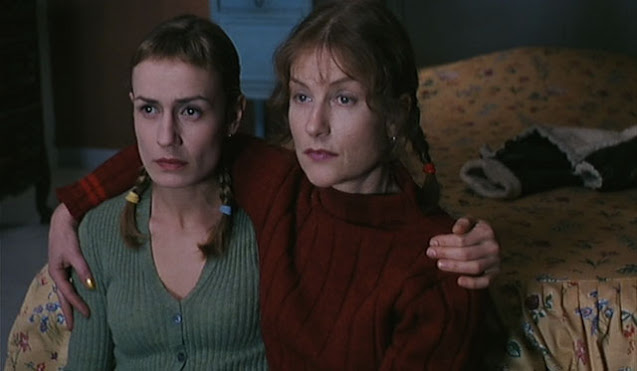La Ceremonie
Spoilers
Writer/director Claude Chabrol calls his 1995 film LA CEREMONIE "Marxist", and I believe ol' Karl would've approved of this discomforting and fascinating story of class struggle. Its central character, Sophie (Sandrine Bonnaire), a maid also seems to possibly suffer from psychosis, as her catatonia renders her detached from her surroundings. Or maybe she's just cognitively impaired. She doesn't willingly engage in conversation with her employers, a wealthy family in rural France. Her awkwardness is palpable. Sophie is transfixed by her television, no matter what is playing. Maybe her behavior is entirely calculated. Maybe her final actions were on her mind from that first interview with house matriarch Catherine Lelievre (Jacqueline Bisset).
Sophie is a thorough, hard working servant. Head down and all business. But she is unable to retrieve a file from Mr. Lelievre's (Jean-Pierre Cassel) desk when he calls. She stares in horror when grocery lists are left for her. She can't even sign her name. We learn quickly of Sophie's illiteracy, though not much later we also see she is quite cunning, Maybe even psychotic. She has a troubling past, one involving a fire and the death of her father. No guilt was ever proven.
Jeanne (Isabelle Huppert), a postal worker whom Sophie befriends, has her own dark spot - a young daughter who died under questionable circumstances. Jeanne is an uninhibited, carefree sort with little regard to decorum or others' privacy; she regularly opens and reads the Lelievres' mail. She seems to have a grudge against them. Maybe the entire bourgeoisie.
In Jeannie, Sophie finds a kindred spirit, a sister in proletariat rage. Is a socialist revolution inevitable? The rise of the woman? The destruction of the tradition family unit?
As you see, I've run with Chabrol's summary. But viewers can also take LA CEREMONIE (well mounted though with a few oddly abrupt scene transitions) as an undilated psych study. Bonnaire gives a perfectly controlled performance, while Huppert creates a mildly frightening persona that is patently unpredictable. The film's grim recount is based on events that occurred in the 1930s. I was reminded at times of Peter Jackson's HEAVENLY CREATURES, another true story that ends in murder. But many of Chabrol's films are about that very subject. I was also reminded of Hitchcock.
The final moments of LA CEREMONIE serve some just desserts, but whether the preceding events were earned will depend on you, invisible audience. Maybe you should just look at everyone and everything as symbols. Emotions and decency seem to be an afterthought in this movie.



Comments